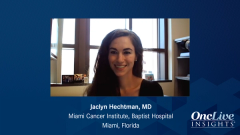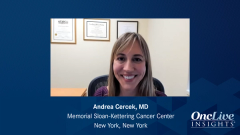
Advice for Providers Treating Metastatic Colorectal Cancer
Experts provide advice for providers treating patients with metastatic colorectal cancer and highlight exciting potential combination treatments on the horizon.
Episodes in this series

Jaclyn Hechtman, MD: What advice do you have for providers caring for patients with metastatic colorectal cancer?
Andrea Cercek, MD: My advice for providers caring for patients with metastatic colorectal cancer is to really arm yourself with all the necessary and important information—not only about the patient, but also about the tumor characteristics and the molecular genomics—because they can make a difference in guiding care and in pushing the envelope and improving survival; and not only survival, but also the quality of life for many of these patients. We've made a lot of advances in MSI [microsatellite instability] and immunotherapy in patients with mismatch-repair deficiency. We now have several active targets including HER2, including KRAS, or KRAS G12C, specifically. It is important to look at the fine print and look at the mutations, and consider all of the potential options. The more therapies that we can offer, the more clinical trials that we can offer our patients, the better our outcomes will be.
Jaclyn Hechtman, MD: That makes a lot of sense. If I were to add one thing here, I'd say to make sure to talk to your pathologist every now and then.
Andrea Cercek, MD: Most important!
Jaclyn Hechtman, MD: If you have something that is bothering you about the way you're testing, and you feel like you want to add a specific IHC [immunohistochemistry] test or work with them to create a workflow so that all the molecular testing that is needed goes through. Because the surgical pathologists are the ones handling the tissue and preparing it and they can work with the lab to separate out cores or do whatever you need to make sure that tissue is handled most appropriately, and so that you have what you need when you need to test. If you're sending it out, or if you want to develop something in-house or whatever it is, maybe for assays. A lot of surgical pathologists have a lot of knowledge about precision medicine these days, so it's something to keep in mind.
Andrea Cercek, MD: Absolutely, that's 100% right and we do it all the time. To that end, also, you shouldn't be practicing alone. This really is a multi-team approach, a multimodality approach in many ways for many patients, so it's important to do as exactly as you said, communicate with the pathologists, ask the surgeon a question if you think that surgery may be an option at least for the discussion to really try to offer our best treatment interventions for the patients.
Jaclyn Hechtman, MD: Are there any other ongoing trials and novel treatment combinations that you are looking forward to seeing the data coming out on?
Andrea Cercek, MD: Yes, in the metastatic setting, the HER2 targeting will continue to evolve in moving to the first-line setting, which is really exciting. There will hopefully be progress in BRAF targeting as well in the first-line setting where we have approval for BRAF V600E in combination, but hopefully moving that to the first-line as well will be positive. And then KRAS: I'm very hopeful. We have made some progress in KRAS G12C, which is a small percent of our patients. But there are active drugs and certainly, preclinical work investigating other KRAS mutations which are very common in colorectal cancer and other GI [gastrointestinal] tumors as well as lung cancer that will continue to move the field forward in that area, and actually very much change things for us, because KRAS was always something that was just so prevalent. Fifty percent of our metastatic patients have KRAS mutations, but we just had nothing to offer them, so that's incredibly exciting.
Jaclyn Hechtman, MD: The mutations up-front eventually emerge.
Andrea Cercek, MD: That's another thing: they're tricky. They're not simple. But it's going to be a good target. It is already looking like that for KRAS G12C, but I think that that's going to be another exciting one.
Jaclyn Hechtman, MD: I am definitely interested in seeing what comes out on that front.
Andrea Cercek, MD: Thank you so much, Jackie, for a really interesting and fun conversation. And thank you to the audience. We hope you find this program informative.
Transcript edited for clarity.






































